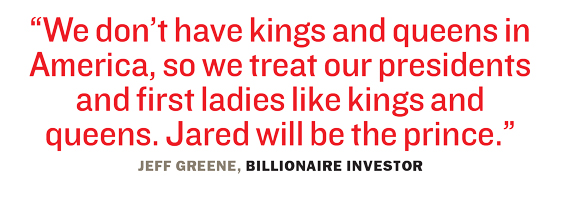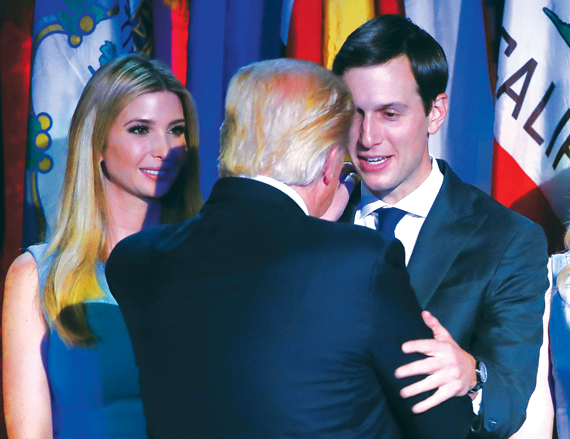As a gangly high school student, Jared Kushner [TRDataCustom] did what most long-limbed kids of his size did: He joined the basketball team. The Frisch School, a well-known private Jewish school in Paramus, New Jersey, took pride in its athletic prowess and had a coach who took losing personally.
In Kushner’s senior year, after a particularly bad home loss, the head of the team seemed on the verge of desperation. It had been a middling season for the Frisch Cougars, and the players had performed particularly poorly that night. During a team meeting, the coach lost it.
“He went crazy and started yelling, saying he hated us,” recalled Arik Lifshitz, a real estate developer who was Kushner’s teammate at the time. As the clock ticked past 9 p.m., he announced that he was quitting.
Then Kushner’s father intervened. A regular at his son’s games and a big fish in local Jewish and real estate circles, Charlie Kushner was known as the Don Corleone of the community, a man who aspired to be a Jewish Kennedy, according to a 2009 New York magazine article. That evening, the elder Kushner strode into the room and talked the hot-headed coach off the ledge, gently reasoning with him, with his young son watching all the while.
“I’m not saying Charlie is the reason he didn’t quit, but I do recall Charlie leading the conversation,” Lifshitz said. “I kept looking at the clock hoping we could finish up and I wouldn’t get in trouble for getting home so late on a school night.”
Fast forward to 2016. Jared Kushner, who declined to comment for this story, has taken the mantle of diplomatic advisor to a plane and place that few, even his smooth-talking father, could have imagined. As the son-in-law to the famously volatile and moody president-elect, the 35-year-old real estate scion and media mogul has been portrayed as the most trusted consigliere in the campaign.
Indeed, in the waning days before the election, when the candidate was reported as being edgy and nervous about the outcome, Donald Trump sought out reassurance from those in his inner circle. The New York Times notably reported that he preferred “the soothing, whispery voice of his son-in-law.”
Those mollifying pep talks have apparently paid off. These days, Kushner is a near-constant presence at Trump Tower and the subject of national news stories. In the span of a few short weeks, he has attended Trump’s meeting with the prime minister of Japan, been floated as a possible peacemaker in the Middle East and is said to have consulted with attorneys about taking a role in the White House that would avoid violating a federal anti-nepotism law.
“We don’t have kings and queens in America, so we treat our presidents and first ladies like kings and queens,” Jeff Greene, the billionaire real estate mogul, recently told The Real Deal. “Jared will be the prince.”
Last month, the media-shy developer granted an exclusive interview to Forbes, which featured him in a flattering cover story. The headline read, “How Jared Kushner Won Trump the White House.”
“There’s no question that Jared’s profile rises every day,” said one political insider, who spoke on the condition of anonymity but who has been a vocal critic of Trump. He called the Forbes story — in which bigwigs, including Rupert Murdoch, Henry Kissinger and former Google CEO Eric Schmidt, heaped praise on Kushner’s kingmaking abilities — a “softball bear hug.”
Among New York real estate insiders, Kushner’s ascension to political fixer has elicited a deafening silence, with a few notable exceptions. In a recent interview with Bloomberg, Joe Sitt, of Thor Equities, said of Kushner, “I think he’s going to be the key to the balance of Donald Trump. He’s someone we want in the White House. He’s going to keep him young and keep him relevant.”
 TRD reached out to more than a dozen individuals for comment, including commercial real estate power broker Mary Ann Tighe and developer Aby Rosen, who has partnered with Kushner in Dumbo but in the days leading to the election plastered a “Vote Your Conscience” billboard on one of his development sites. Nearly everyone declined or did not respond.
TRD reached out to more than a dozen individuals for comment, including commercial real estate power broker Mary Ann Tighe and developer Aby Rosen, who has partnered with Kushner in Dumbo but in the days leading to the election plastered a “Vote Your Conscience” billboard on one of his development sites. Nearly everyone declined or did not respond.
It could be a case of sour grapes — or more likely, a fear of upsetting an industry peer who has suddenly become more empowered. In many ways, like the media at large, the real estate community sorely underestimated Kushner as well as Trump. As recently as August, a political insider told TRD that Kushner’s willingness to take on such a prominent role in the Trump campaign would forever tarnish his legacy.
“The first sentence of his bio will always read ‘Trump’s son-in-law,’ and all of the lasting negatives that go with that will follow him. You mess with the skunk, you get the stink. And the Trump stink is lasting,” the source said.
That same month, Kushner’s younger brother Josh, a successful tech investor, publicly said he would not vote for Trump.
In the end, Kushner withstood the snickering. More importantly, he saw his image evolve from naïve bystander to savvy political operative. In July, he took heat for defending his father-in-law against charges of anti-Semitism after an Observer reporter criticized some of Trump’s more unsavory supporters. Soon after came reports that the son-in-law’s involvement in the campaign was deeper than many had realized. A Vanity Fair story called him Trump’s “mini-me.” In late August, Kushner, who has no political experience, was said to have arranged Trump’s meeting with the president of Mexico. More recently, he has been credited with building Trump’s data-driven campaign, which homed in on donors using Facebook’s micro-targeting technology. “I called some of my friends from Silicon Valley, some of the best digital marketers in the world, and asked how you scale this stuff,” Kushner told Forbes. “They gave me their subcontractors.”
But yet another side of Kushner has emerged, that of ruthless avenger. In August, it was revealed in an Esquire profile that as publisher of the Observer, he repeatedly — and unsuccessfully — ordered a hit piece on Richard Mack, after the latter allegedly refused to write down a loan on 666 Fifth Avenue, a building his company owned that was facing default. The depiction of Kushner as a spiteful power monger forged a new narrative. Last month, after the New York Times reported sources as saying Kushner was responsible for the score-settling ouster of New Jersey Governor and Trump insider Chris Christie — who as attorney general spearheaded the tax evasion and witness tampering case that landed Kushner’s father in jail — the story seemed more than believable. A more complex story of Christie’s falling out later emerged in the Times, however, and Kushner himself denied pushing Christie out in the Forbes story.
Politics aside, exactly what Kushner’s new sphere of influence will mean for his real estate business remains a source of intense speculation, particularly within New York business circles. His firm, Kushner Companies, has become a force in the city’s real estate market, making acquisitions worth more than $3 billion since 2005, according to Real Capital Analytics.
“The question is if Jared advises his father-in-law as a measure of public service or if it’s a back door to leveraging government power to push private monetizing, the way the rest of the Trump family appears to be doing,” said the aforementioned political insider. He said he viewed Kushner as becoming an unofficial advisor along the lines of a Valerie Jarrett, “a person that different communities and sectors know that they can use to get to the president.”
Robert Ivanhoe of Greenberg Traurig, a respected real estate attorney who represents Kushner, downplayed the impact. “I don’t know how much power in business really comes from the fact that your father-in-law is president,” he argued. “For the people who go and bid on a real estate transaction, it comes down to who’s going to pay the best price.”
He said that when it comes to getting a loan, Kushner has “always been an honorable person with a quality reputation.”
But he added: “Maybe having his father-in-law being president will help that even more.”
Similarly, Greene said that with his newfound celebrity, capital providers might unconsciously favor Kushner going forward. “That’s why celebrities get paid the big bucks for photo ops,” he said. “Roger Clinton got a lot of attention when Bill Clinton became president, and he wasn’t even involved.”
Yet it’s unclear how much Kushner’s company really needs him. He was thrust into a leadership role at the company in 2005 after his father went to prison. Although he officially became CEO in 2008, sources have said that Charlie continues to play a significant behind-the-scenes role at the company. Kushner is said to call the final shots when it comes to acquisitions and other major decisions, but sources also say his father is consulted on almost every aspect of the business.
In the run-up to the election, Kushner named Laurent Morali, who joined in 2008 from Calyon Securities, the company’s new president, its first in a decade. “I’m sure Jared’s got a good team, and his business should be able to continue without him,” said Don Peebles, a developer who knows Kushner.
Indeed, the company has been plowing ahead with deals. Last month, a debt fund under the Kushner Companies umbrella provided a $33 million loan to Toby Moskovits’ Heritage Equity Partners for a new mixed-use office-and-retail project at 215 Moore Street in Bushwick.
Kushner’s foray into media has been less successful. Last month, the Observer announced an end to its print edition, just short of its 30th anniversary as a weekly paper. Amid staff and editorial changes over the years, the paper’s influence among the city’s power brokers is seen as having largely been diminished.
But the biggest unanswered question may be this: What exactly is Kushner after? Some have speculated that he craves power and being part of the wealthy elite, citing his purchase of the Observer, an attempt to buy the L.A. Dodgers and his trips on yachts with the likes of Rupert Murdoch and David Geffen.
But some, including Lifshitz, objected to that characterization.
“We never talked about family and money and wealth,” he said. “People who came from less would rub it in your face more. He came from the most, but it was never talked about. He didn’t need to brag about it.”
He added: “The best way to prove your adversaries wrong is through results, and the results speak for themselves.”
